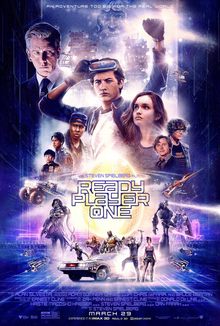Director: Steven Spielberg
Cast: Tye Sheridan, Olivia Cooke, Ben Mendelsohn, T.J. Miller
Have I Seen it Before: Yes. In the theater. In 3d and IMAX. I’m not sure why I did that.
Did I Like It: Sure… Let’s go with that.
First bit of business when discussing this film. Yes, I read the book. It was shortly after its release. I thought it was fine, if slightly forgettable. Others have been very down on the work of the book. I neither fully agree or disagree with them. I also read author’s Ernest Cline’s second novel, Armada, which I really hated. I hated Armada so much that after listening to the audio book, I disliked narrator Wil Wheaton a little bit. The stink was that bad.
Early in the development of Ready Player One, there appeared to be a very real possibility that Robert Zemeckis (Back to the Future (1985), Who Framed Roger Rabbit (1988)) appeared to be a lock for the director’s chair. This seemed like the right choice. With Roger Rabbit, he proved ages ago he could juggle an army of cameos from a disparate array of intellectual properties. That should have sealed the deal right there. With attempts like Polar Express (2004), Beowulf (2007), and A Christmas Carol (2009) he proved that—if by trail-and-error alone—he had more experience than Peter Jackson or James Cameron with the motion capture the film would require. Even if he would be forced to work with the DeLorean Time Machine again, that would only a small drop of self-referential-itis, a word I’ve just made up.
Instead, and with some degree of surprise, Steven Spielberg agreed to direct. Considering the film is steeped in 80s pop culture, this is sort of like hiring Pope Pius XII to make The Ten Commandments (1956)*. Too much self-referentialism—another word I apparently just made up—can be a bad thing.
Thankfully, Spielberg is indisputably more of a master of the cinema than Cline is of the novel, so the movie flies above the source material. Wherein the book makes extensive references to WarGames (1983), the reality that Spielberg trying to do an extensive homage to John Badham fell by the wayside in favor of a scene borrowing from Kubrick’s The Shining (1980). Spielberg reaching for Kubrick makes a lot more sense.
Ultimately, Spielberg made the best version of this story possible. He’s made far better movies in recent year, most frequently when he eschews the pop sensibilities of his earlier career, and he’ll probably make better movies still. Ultimately? Give Lincoln (2012) or even The Post (2017) a look, and also give a look to all the other properties that prop this one up.
*Any person possessing a problem with that analogy should email complaints@partyapocalypse.com, an email address that—to date—does not exist.

